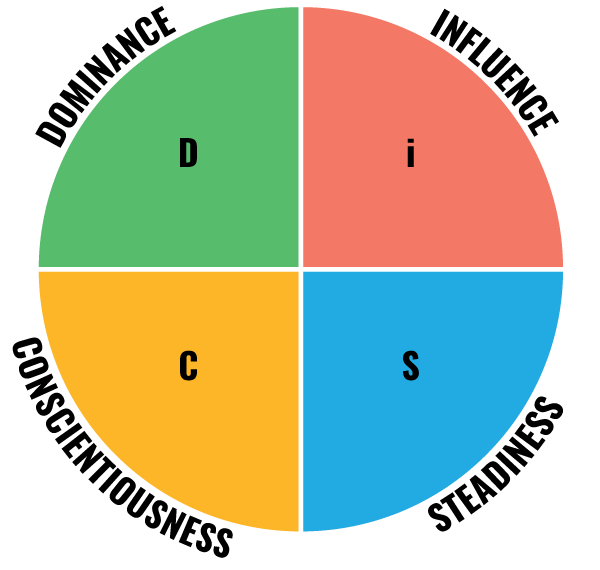
Personality assessments are tools that are used to measure an individual’s personality traits, characteristics, and behavior. They are commonly used in a variety of fields such as career counseling, employee selection, and clinical psychology. There are many different personality assessments available, each with its own strengths and limitations.
Of course, at VCC.Academy we have our preference for personality tests in a veterinary hospital or clinic. I’ll share my preference below. First, I want to discuss the five most common personality assessments:
- The Myers-Briggs Type Indicator (MBTI)
- The Big Five Personality Traits
- The 16 Personality Factors (16PF)
- The Minnesota Multiphasic Personality Inventory (MMPI)
- DiSC
Myers-Briggs Type Indicator (MBTI)
The Myers-Briggs Type Indicator (MBTI) is a self-report questionnaire that assesses an individual’s personality based on Carl Jung’s theory of psychological types. The test measures four dichotomies: Extraversion vs Introversion, Sensing vs Intuition, Thinking vs Feeling, and Judging vs Perceiving. It is commonly used in career counseling and personal development.
- Pros: It provides a framework for understanding individual differences, easy to understand and interpret results, and it is widely used.
- Cons: It has been criticized for its lack of empirical support and for not being a true measure of personality.
Big Five Personality Traits
The Big Five Personality Traits test, also known as the Five Factor Model (FFM) assesses an individual’s personality based on five broad dimensions: Openness, Conscientiousness, Extraversion, Agreeableness and Neuroticism. It is widely used in psychological research and in a variety of fields such as personnel selection, education, and clinical psychology.
- Pros: It has been found to have good reliability and validity, and it is based on a large body of empirical research.
- Cons: It does not account for more specific personality traits and some people may not fit comfortably into the five categories.
16 Personality Factors (16PF)
The 16 Personality Factors (16PF) assessment is a self-report questionnaire that assesses 16 different personality traits. It is used in a variety of settings such as career counseling, employee selection, and clinical psychology.
- Pros: It has been found to have good reliability and validity, and it provides a detailed and comprehensive assessment of an individual’s personality.
- Cons: It can be time-consuming to complete and interpret the results.
Minnesota Multiphasic Personality Inventory (MMPI)
The Minnesota Multiphasic Personality Inventory (MMPI) is a self-report questionnaire that assesses a wide range of personality traits and psychopathology. It is commonly used in clinical psychology and in legal and forensic settings.
- Pros: It has been found to have good reliability and validity, and it provides a detailed and comprehensive assessment of an individual’s personality and psychopathology.
- Cons: It can be time-consuming to complete and interpret the results, and it has been criticized for its lack of cultural sensitivity.
DiSC
The DiSC assessment is a personality assessment tool that measures an individual’s behavior and attitudes in four dimensions: Dominance, Influence, Steadiness, and Conscientiousness. It is commonly used in team-building, leadership development, and conflict resolution.
- Pros: It is easy to understand and interpret the results, and it can be useful for understanding and managing interpersonal relationships.
- Cons: It has been criticized for not being based on a well-established personality theory and for not having adequate reliability and validity.
What’s VCC.Academy’s Preference?
If you know much about us, you might have already guessed that we prefer DiSC. The reality is, that all personality assessments can be valuable tools for understanding an individual’s personality traits, characteristics, and behavior. These tests, and others, can be used in a variety of settings such as career counseling, employee selection, and clinical psychology.
But, why do we prefer DiSC? You may have noticed that it has some criticisms such as not being based on a well-established personality theory or not having adequate reliability and validity. But, you’ll notice there are similar concerns about other tests as well.
The reality is that no test is going to give you the full picture of someone’s personality. People are simply too complex to categorize into neat little groupings. In fact, the more groupings you have, the more difficult the test is to interpret. (See the cons on the 16 Personality Factors.)
At VCC.Academy we believe that the pros for the DiSC assessment give us the answer to that question of why we prefer DiSC. The hospital environment, like any other business, needs team-building, leadership development, and conflict resolution. We are confident that DiSC provides the best approach in hospitals, clinics, and businesses.
The Bottom Line
To make the decision on what’s right for you, remember that no one assessment is perfect and it’s crucial to consider your specific needs as well as the aims of the assessment before selecting one. Keep in mind that the results of these assessments should be interpreted by a professional who has been trained to do so. Because each assessment has its own strengths and limitations, be sure to select one that is most likely to help you reach your goals.

Corey Smith, MBA
President
I have come to veterinary medicine from a truly non-medical and non-veterinary path. With early roots in 4-H and, as a youth, owning 4 horses, 2 ponies, 2 dogs, 1 cat, 1 sheep, a whole slew of rabbits, and even a giraffe (that’s a story for another day), I am decidedly not a veterinarian. I'm a businessman, marketer, and talented coach. Whether I'm coaching in business, marketing, or helping leaders understand how their personality affects their interpersonal and client relationships, my goal is to help leaders be the best they can be.

